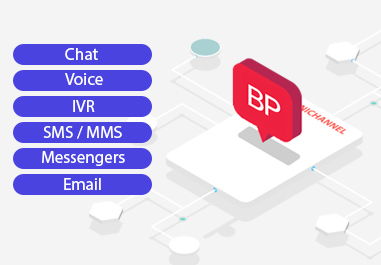Omnichannel contact center solutions have already upended the custom care scene. They’re providing shorter wait times, faster resolutions, and more profits. It turns out that a comprehensive care experience seamlessly translating across all mediums is effective – who knew?
However, integration with the power of AI can take omnichannel care even further. In this article, we’ll explain the benefits of AI in customer service and how it’s transforming support systems.
What Is an Omnichannel Contact Center?
An omnichannel contact center creates a seamless customer support experience across all mediums. They are often part of a larger CCaaS suite of customer service tools.
Omnichannel integrates email, phone, web chat, social media, SMS, and more into one cohesive system. As a result, customer service agents get the full context of every interaction via any channel.
For example, imagine that a customer has a problem with your product and calls your contact center. First, they discuss the issue and end the call when they think they’ve found a solution. Then, they use web chat to get help when the issue crops up again.
That web chat agent will automatically have access to the customer’s info and history thanks to seamless omnichannel integration. Then they can pick up where they left off without rehashing the problem.
This is the power of an omnichannel contact center.
What Are the Benefits of an AI-Powered Omnichannel Contact Center?
Artificial intelligence has already profoundly impacted customer experience (CX). For example, AI has automated chatbots, interactive voice systems, emails, and other tier-one service solutions. This has resulted in both greater margins and happier customers for businesses worldwide.
The fusion of omnichannel CX and AI is no joke. This game-changer game-changer poses enormous benefits for businesses of all sizes. Here’s how artificial intelligence call centers are transforming contact centers:
1. Support That’s Always Available
Artificial intelligence never sleeps, ensuring automated chatbots and voice systems are always available to eager customers.
Customers will have problems at all hours of the day, while agents can only remain online so long. To alleviate this, AI support can guide customers through your existing knowledge base and lead them to solutions without further intervention.
If the customer still needs help, AI can arrange a ticket with a real person. They can even prioritize the customer according to the urgency of the issue.
2. Large-Scale Data Management
Analyzing data by hand can become increasingly difficult and time-consuming as you gain customers. AI can track every aspect of your omnichannel outcomes, meaning better data for further calibration of your CX.
Most omnichannel contact center solutions include analytics tools that let you track your team’s performance in great detail. For example, you can track handling times, calls made, chat room satisfaction, and more to polish each aspect of your support experience. This means a better CX leading to reduced churn rates and higher profits – especially when synced with your CRM.
3. Reduced Costs
AI-enhanced omnichannel contact center solutions make for outstanding value reflected in several different ways.
Firstly, the automation of support systems reduces stress on human support staff. This leads to greater profit from more productive staff and the elimination of now-redundant positions.
Secondly, AI also reduces the skill required for certain support positions. Since AI can automate many tasks, new support specialists will have an easier time onboarding to their jobs. This means less time spent on training employees who will hit the ground running.
Thirdly, AI makes for a better customer experience overall. Every aspect of CX can be enhanced, from sales to technical support. For example, customers can ask AI chatbots questions and receive precise answers from your knowledge base.
If the customer needs more help, the chatbot can arrange a call or email ticket with a human agent. This results in more efficient marketing and less money lost to customer churn.
4. Personalized Customer Experience
AI-powered customer service allows for complete service personalization. For instance, CRM integrations allow AI to identify customers based on name, service plan, location, and more. This presents a wide variety of outcomes.
Firstly, AI can prioritize customers according to their service plan. As an example, a customer on a $1,000 annual plan would have access to a human faster than a customer paying $50. This results in increased satisfaction for high-value customers and thus higher retention.
Secondly, AI can help with upselling. For example, if a customer asks about a service unavailable with their plan, an AI can recommend an upgrade and describe the benefits. They can also contact them about upcoming payments or help with failed transactions.
Lastly, it results in a better experience for all customers. Chatbots and voice assistants who respond based on personal information create richer experiences with more streamlined care. Customers don’t have to waste time identifying themselves and can receive quick answers to account questions.

5. Customer Needs Better Understood
If you want to beat your competitors, customer service will be one of your biggest weapons. Firms that prioritize customer service can see revenue growth of up to 8%. This makes it essential to understand your customers’ needs and how you can better serve them.
Omnichannel AI can generate in-depth customer reports thanks to the data it gathers. By developing these reports, AI will equip your firms to identify gaps in your service and provide quick fixes. In return, you get happy customers who keep coming back.
6. Insignificant Tasks Automated
Omnichannel contact center solutions allow firms to leave smaller tasks to robots while humans focus on bigger problems.
For example, a human agent doesn’t need to waste time answering repetitive questions while panicked customers are waiting for help with pressing tech issues. Instead, AI can handle basic questions and only call in a human when needed. This results in a much more efficient labor allocation across your contact center.
7. Total Accuracy
The only way AI makes a mistake is if it’s programmed incorrectly. On the other hand, even the best-qualified representatives can make mistakes, which is why 10% of consumers report being frustrated by inaccurate service. Depending on the issue at hand, those errors could cost your business dearly.
For instance, imagine that a representative misquoted a price to a customer during a sales chat. Depending on the jurisdiction, you could be obligated to accept that price and lose the difference. Now consider what would have happened if it was a bot answering sales questions. Since they only recite the data you give them, there’s no chance of such a costly slip-up.
While bots can’t completely replace customer service reps, the technology provides immense support to the vocation.
8. Better Communication
AI-driven speech-recognition tools analyze customer service call recordings for content and tone. For example, voice analytics can recognize when a customer is stressed or angry during a call with a virtual representative. They can then be prioritized for human support, potentially saving them as a customer.
You can also use voice analytics to spot occurrences of customer frustration on a large scale. Businesses can use this to identify representatives who need additional training or find flaws in support procedures.
9. Smoother Transitions to Human Assistance
While AI is returning impressive results, it can’t run a contact center alone. Fortunately, AI can recognize its own limitations and switch to human assistance without being asked. This reduces frustration and results in a better experience for the customer.
10. Conversational AI Chatbots
Thanks to natural language processing and machine learning advances, AI will only become better at filling gaps in customer service. Expect chatbots to mimic human interactions better, blurring the line between bot and human. It will get to the point where customers may not even realize they’re speaking to an automated system as the language systems advance.
Imagine a 24/7 virtual assistant who can intelligently articulate answers to sales and support questions on your website. Through this feature, a customer could ask specific questions and receive precise, non-cookie cutter responses on demand. This means inevitable boosts in conversions and profits.
11. Faster Agent Training
AI-powered contact center tools can significantly accelerate new hire onboarding. Virtual assistants, interactive tutorials, and gamification can streamline the process and reduce employee frustration.
This plays into the broader trend of enhancing employee productivity with AI, and how artificial intelligence is transforming contact centers. For instance, virtual employee assistants perform mundane tasks while workers concentrate on more critical issues.
12. Providing Proactive Support
AI-based analytics allow support systems to understand what a customer needs help with before they even ask. AI interprets signals like clicks, page views, and other actions to prepare predetermined responses when support is requested.
For example, AI might recognize that someone reading about a specific product issue needs human assistance in most cases. In response, a chatbot could ask customers if they need to speak with a representative.
Omnichannel AI: Taking Customer Care to New Heights
Artificial intelligence’s impact on omnichannel contact center solutions is just beginning. AI is only improving the seamless transitions of the omnichannel model and providing further enhancements all around.
As the tech improves, your company can only expect better customer care, higher margins, and lower churn rates – and nowhere will you see the benefits of AI in customer service more evident than at Bright Pattern. Talk to us about how AI-powered omnichannel CCaaS solutions can revolutionize your customer care and request a demo today.





